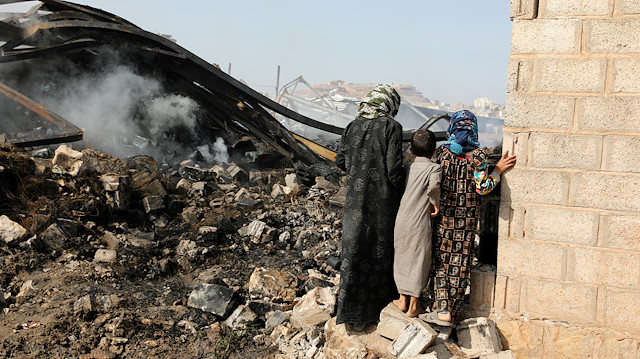
With around 2,000 days passing since an Arab coalition led by Saudi Arabia launched a military offensive in Yemen to support its legitimate government against the Iranian-backed Houthi militia, little has changed as political infighting and a humanitarian crisis drag on in one of the Arab world’s poorest countries.
The military intervention was launched on March 25, 2015 at the request of President Abdrabbuh Mansur Hadi, who was exiled by the Houthis from the capital Sanaa after it fell under the control of the Shia militia on Sept. 21, 2014.
It was initially welcomed by many Yemenis, who hoped the Houthis’ reign would end in a few weeks.
While the Arab coalition, government forces and other militias it backed have been able to retake some governorates mainly in the south, west and southwest, the Houthis still control most of the northern governorates such as Ibb, Dhamar, Amran and Raymah.
The southern port city of Aden has been Yemen’s temporary capital after it was liberated by government forces with the support of the coalition in July 2015.
The coalition launched a large number of airstrikes on Yemeni areas, some of which killed civilians, while others killed soldiers among the forces supported by the coalition.
In March this year, the Houthis claimed through their military spokesman Yahya Saree that the coalition had launched more than 257,000 airstrikes on Yemen since the start of the intervention.
On the other hand, the group reported that it had launched more than 410 ballistic missiles at vital Saudi installations.
The coalition said in June that it had intercepted 313 ballistic missiles launched against its territories while 357 unmanned drones have also been brought down and destroyed.
Perhaps the most prominent airstrike carried out by the coalition was the one that killed Saleh al-Samad, the head of the so-called Supreme Political Council of the Houthis, in April 2018 when his car was targeted in the port city of Hodaydah.
On the other hand, the Houthi rebels’ most famous attacks on Saudi Arabia came in September 2019, when they used drones to target two oil production facilities belonging to the state oil company Saudi Aramco.
The coalition has been accused of deviating from its primary goal of restoring the legitimate government of Yemen and liberating territories under Houthi control to resorting to the “liberating of the liberated,” or military expansion into areas in the east of the country not under the Houthi administration.
To this day, there is neither victor nor loser.
Yemeni citizens continue to pay the price in a war that has resulted in the world's worst humanitarian crisis as millions are on the brink of starvation.
There is no end in sight to the war in the country.














